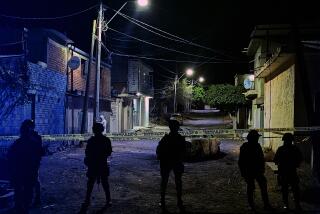Violent May Day protests in Athens
Wielding red flags and hurling crude gas bombs, dozens of militant youths clashed with riot police Saturday in central Athens, signaling swelling social unrest as the cash-strapped Greek government prepares to announce additional austerity measures required to win rescue loans from the European Union and the International Monetary Fund.
The clashes came during massive May Day protests called by Greece’s powerful trade unions and left-wing political parties in a desperate bid to block the plans for additional wage cuts, tax increases and pension reductions.
“The bill should go to those who looted this country for decades, not to the workers,” said Spiros Papaspirou, head of Greece’s powerful Adedy civil servants union. “This is the most savage, unjust and unprovoked attack workers have ever faced.”
Saturday’s protests drew nearly 20,000 workers to the streets of the capital, bringing traffic and trade to a standstill as demonstrators filed by the Finance Ministry building chanting slogans against the government, the EU and the IMF.
Clashes erupted when youths tried to push through a police cordon blocking access to the nation’s sprawling all-marble Parliament complex. Riot police fired at two least rounds of tear gas that sent protesters into a retreat, though some hurled rocks, set garbage cans ablaze and threw petrol bombs at two television vans.
At least eight people were detained, police said, five of them immigrants suspected of looting merchandise from shops targeted during the protests. Riot squads remained on alert as large teams of black-clad anarchists were seen taking refuge at an Athens university where police are barred from entering.
Well into the throes of the country’s worst financial crisis in recent history, Greeks have grown increasingly angry and angst-ridden since Prime Minister George Papandreou announced last month that his government would avail of a multibillion-dollar bailout patched together by the two international organizations.
The new austerity measures, expected to yield about $30.5 billion, are to be announced Sunday before Finance Minister George Papaconstantinou leaves for Brussels to sign off on the final terms of a reported three-year, $160-billion rescue package.
The rapid rush to sign the bailout package follows a turbulent week that saw Greece’s sovereign debt fall to junk status, fanning fear that debt-strapped Athens would not have access to the EU’s aid package before an $11.3-billion bond redemption this month.
Anxiety also spread across the Atlantic, with President Obama calling German Chancellor Angela Merkel to urge her take a stronger position in trying to calm markets and avoid spreading the fear to other euro-using countries.
French Finance Minister Christine Lagarde said she expected a final settlement of the Greek aid package by Sunday night.
Still, social unrest, coupled with Greece’s slow-moving bureaucracy, could imperil the government’s chances of implementing the new austerity measures.
“The socialists came to power promising [a] redistribution of wealth after years of corrupt center-right governance,” says Alec Mally, a market analyst. “Now, the Greeks feel duped. The social justice part of this government has been dropped out and that has them mad.”
Among the austerity measures expected are the abolition of bonuses paid to both public and private sector workers each year, raising the sales tax to 23% to 25% and cutting pension benefits.
Greeks earlier had seemed willing to back belt-tightening measures. But in recent weeks, polls have suggested a dramatic about-face.
In one survey, 61% said they were against the government’s decision to ask for the aid package, which allows the EU and IMF to dictate additional budget cuts. Another poll showed 51.3% of saying they would take to the streets if the new measures are enacted. Parliament is expected to pass the plan this week.
In other capitals across the world, hundreds of thousands of workers engaged in spirited but generally peaceful May Day rallies. In Turkey, about 140,000 people gathered in Istanbul’s Taksim Square, and in Cuba, hundreds of thousands marched through Havana’s Revolution Square, most wearing red shirts and many waving red flags.
In Moscow, a rare protest by hundreds of opposition activists was held, with a crowd yelling slogans comparing Prime Minister Vladimir Putin to Soviet dictator Josef Stalin. In Macao, off the Chinese mainland, at least eight people were injured when police used water cannons and pepper spray on protesters.
Times wire services were used in compiling this report.
More to Read
Start your day right
Sign up for Essential California for news, features and recommendations from the L.A. Times and beyond in your inbox six days a week.
You may occasionally receive promotional content from the Los Angeles Times.






